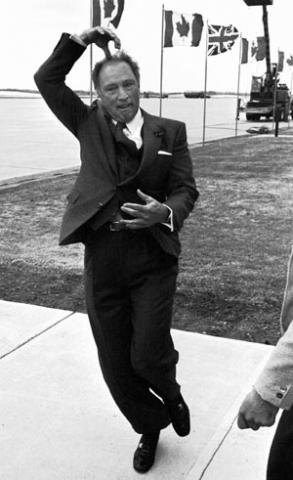Pierre Trudeau’s many detractors — a group that remains large in number and fervent in its beliefs — won’t need to read The Truth About Trudeau, a new book that seeks to offset the friendly treatment Canada’s 15th prime minister has enjoyed from biographers and historians.
They’ve been making the same argument for years, perennially frustrated that other Canadians couldn’t see what to them was self-evident: That the prime ministerial years of Pierre Trudeau were a disaster for Canada from which we are still trying to recover.
But they’ll love the book anyway, as it represents, at last, confirmation of all they’ve believed. This is not yet another biography, but a step-by-step examination of the Trudeau record. It’s an orderly and straightforward package, as you might expect from a seasoned public policy and management consultant, which is what author Bob Plamondon does for his day job. He’s also keenly interested in Canadian history and the author of two books on Conservative politics and prime ministers.
And there they are, all Trudeau’s sins, laid out in meticulous detail. And so many of them: the sheer breadth can’t fail but impress, even to those already familiar with the record.
Trudeau on the economy, piling up massive debts and leaving the bill for later generations. Trudeau the internationalist, cavorting with dictators while barely masking his contempt for occupants of the Oval Office he viewed as lesser beings. Trudeau the constitutionalist, condemning the country to a decade of wrangling over amending formulas and opt-out clauses while unemployment soared and the economy slipped into stagflation. Trudeau the champion of unity, fatally alienating western Canadians while he focused obsessively on his home province.
Almost 30 years after he left office, Trudeau’s legacy remains largely the preserve of friendly figures pouring out one forgiving biography after another. It started even before he left office: The Northern Magus, by Richard Gwyn, a columnist at the Toronto Star, which was and remains among the country’s most loyal keepers of the Trudeau flame. Trudeau, by George Radwanski, another columnist and later overseer of The Star‘s Liberal-friendly opinion pages. The two-volume Trudeau and our Times, by Christina McCall and Stephen Clarkson, a one-time Liberal candidate and party supporter who was married to Adrienne Clarkson, the Liberal-appointed Governor General.
Their accounts reflected the same essential view: Pierre Trudeau was a towering figure in Canadian politics, a man of enormous intellect and personality, with an acute drive and vision for the country, which he pursued fiercely through 15 tumultuous years as prime minister. Canadians didn’t really understand him, nor did they particularly like him, but they elected and re-elected him between 1968 and 1984, during which he left an indelible mark on the country. Fade to black.
Often missing was any critical analysis of the impact of his policies.
It was at a 2009 dinner honouring John English, a former Liberal MP chosen by the Trudeau family to tell the story yet again, that Globe and Mail columnist Lawrence Martin — who respects and defends Trudeau — suggested Plamondon, as a Conservative, write “the other side of the story.”
Plamondon says he didn’t set out to portray Trudeau in a negative light.
“Beyond introducing Trudeau to a new generation of Canadians, which in itself made the book worth doing, we need a better understanding of the Trudeau record if we want to solve the problems of today,” he says.
But it’s not a story of success. “No prime minister did more damage to national unity,” Plamondon writes. Trudeau’s obsession with Quebec alienated half the country, helping reduce what was once a great national political organization to the third-place afterthought it is today. While Trudeau won four of five federal elections, after 1968 he lost every contest outside of Quebec, Plamondon recounts. As an international figure, Trudeau was diverting and often entertaining, yet his antics often came at the expense of the country’s best interests. His crowning achievement, Canada’s constitution and Charter of Rights, was welcomed by a generation of lawyers and scholars, but created a “human rights industry” that threatens some of the very rights it was meant to defend, while fuelling judicial activism and putting critical national decisions in the hands of appointed judges.
And there’s the economic record: Under Trudeau the debt grew tenfold, while federal spending ballooned from $13 billion to $109 billion. His 1984 deficit, measured as a percentage of gross domestic product, would equal $133 billion in current terms.
Contrary to belief, Trudeau did not open Canada’s doors to a flood of new immigrants: arrivals actually fell sharply in the decade after 1967. Nor did his spending rescue Canadians from poverty: when he left office more than 40% of unattached seniors lived in poverty; as did 42% of households headed by women, more than triple the level of the early 1960s.
Trudeau’s defenders maintain his poor economic record needs to be viewed against the times, when the first oil shock sent western economies into a tailspin. Plamondon responds that “I read every budget document from 1968-1984, something I doubt other biographers have done,” and that Canada badly underperformed even against other countries.
It will take more than one book to dent the heavy bias that has enveloped the Trudeau legacy over so many years. The Truth About Trudeau may not single-handedly alter perceptions of the Trudeau legacy, but it will make it harder for biographers to ignore so much of it.
Kelly McParland: Pierre Trudeau’s disastrous record is finally laid out for all to see





























Laissez un commentaire Votre adresse courriel ne sera pas publiée.
Veuillez vous connecter afin de laisser un commentaire.
Aucun commentaire trouvé